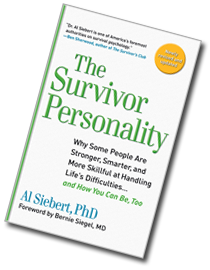Survivor Qualities Quiz
As seen on OPRAH!
by Al Siebert, Ph.D., author of The Survivor Personality
Life's best survivors thrive in situations that wear others down. To thrive means to gain strength from adversity without becoming a victim. Thriving means to become better in circumstances that make others bitter.
The survivor personality research shows that a person who thrives in a world of non-stop change is much different than a person who was raised to fit into a world with little change. Every survivor and thriver is unique, yet they all have similar strengths and skills.
This seven item quiz was given to the Oprah studio audience before the "Would You Survive?" program (aired primarily on March 11, 1997). The "A" choice in each pair is the answer describing an important survivor quality.
Which one of the following statements describes you best, statement A or statement B?
Item One
- When there is an emergency, I control my feelings and focus on handling it until it is over.
- I get so frightened and anxious in emergencies, I don't know what to do.
Survivors avoid feeling overwhelmed by paying close attention to what is happening and to what they need to do. When Jerry Schemmel's plane was about to crash, for example, he was concentrating on how after the crash he would help the two mothers with children sitting in the row ahead of him.
How well have you handled an emergency?
Item Two
- When trouble develops I expect to handle it and make things turn out well.
- When something starts to go wrong I fear the worst and hope someone will stop it.
Item Three
- When I don't handle a person very well, I try to figure out a way to handle them better the next time.
- When I have a bad experience with someone, I try to avoid them in the future.
Item Four
- I've gotten into trouble asking too many questions.
- If people want me to know something they tell me.
Item Five
- I have so many contrary feelings I puzzle people and myself, too, sometimes. I'm both playful and serious, pessimistic and optimistic, selfish and unselfish. The list goes on and on.
- I'm predictable. I'm basically a helpful, cooperative, nice person.
(or) People don't mess with me. I'm tough. I have an attitude.
Item Six
- I trust my intuition when I don't have all the facts.
- Going on feelings is unreliable. I go on facts and good logic.
Item Seven
- I'm a better person because of the bad experiences I've been through.
- I'm worse off today because of the bad experiences I've been through.
The talent for serendipity is the best indicator of all. Cindy Wells, featured in the May, 1997, Thriving Story of the Month says:
"I have found that the purpose of dealing with chronic illness is not to necessarily get well but to live well.... Ironically, even with this illness I am probably more alive than most people will ever be."
To overcome a rough experience keep asking: "Why is it good that this happened? What is the gift? How can I make things turn out well?"
Oprah is an outstanding example of a person made stronger by bad experiences. Her story is so inspirational, I featured her in the April, 1997, Thriving Story of the Month.
Adapted from The Survivor Personality, by Al Siebert, Ph.D.
© 2010 Berkley/Perigee Books
